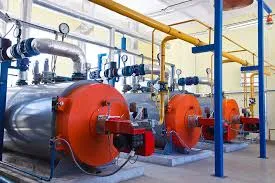
12월 . 04, 2024 02:38 Back to list
thermal oil boiler design
Designing a Thermal Oil Boiler Key Considerations and Principles
Thermal oil boilers are essential components in various industrial processes that require efficient heat transfer. Unlike traditional steam boilers, which utilize water as a heat transfer medium, thermal oil boilers use organic thermal fluids, providing superior temperature control and energy efficiency. In this article, we will explore the fundamental design principles and considerations involved in creating an effective thermal oil boiler.
Understanding Thermal Oil Systems
Thermal oil boilers operate by heating oil to high temperatures, enabling the transfer of thermal energy to different processes or equipment. The oil is circulated through a system of pipes and heat exchangers, allowing for temperature control ranging from 300°C to 400°C, significantly higher than the boiling point of water. This characteristic makes thermal oil systems suitable for numerous applications, including food processing, chemical production, and paper manufacturing.
Key Design Considerations
1. Thermal Oil Selection The choice of thermal oil is crucial in the design of the boiler. Factors such as thermal conductivity, temperature range, and stability at high temperatures should be considered. Commonly used thermal oils include synthetic oils and mineral oils, each with its own set of properties, advantages, and limitations.
2. Heating Element Design The heating elements, typically designed as coil tubes or shell-and-tube configurations, play a significant role in the efficiency of heat transfer. The design must ensure a large surface area for effective heat exchange while maintaining safe operation limits. Materials used for the heating elements should withstand high temperatures and resist corrosion.
3. Safety Features Safety is paramount in thermal oil boiler design. The system must include safety valves, temperature gauges, and pressure sensors to monitor operating conditions continuously. Additionally, it is critical to incorporate an emergency shutdown system and explosion-proof measures, considering the flammable nature of thermal oils.
thermal oil boiler design

4. Insulation and Efficiency To minimize heat loss and enhance efficiency, proper insulation of pipes and the boiler body is necessary. High-quality thermal insulation materials can help maintain the desired temperature while reducing energy waste. Conducting regular energy audits can also identify areas for improvement in energy efficiency.
5. Control Systems Modern thermal oil boilers are equipped with advanced control systems that allow for precise regulation of temperature and flow rates. Incorporating programmable logic controllers (PLCs) and automation ensures that the system operates optimally, responding to the varying thermal load of the industrial process.
6. Environmental Considerations It is essential to design thermal oil boilers with environmental sustainability in mind. This can involve selecting thermal oils that have lower environmental impact, implementing flue gas treatment systems, and ensuring compliance with regulatory standards by reducing emissions.
Applications of Thermal Oil Boilers
Thermal oil boilers find widespread usage across various industries. In the chemical industry, they heat reactors and distillation columns, while in food production, they are employed for frying and cooking processes. Other applications include drying processes in textiles and wood products. The flexibility and efficiency of thermal oil systems make them suitable for any application requiring stable and controlled heating.
Conclusion
In conclusion, the design of thermal oil boilers is a multidimensional process requiring careful consideration of various factors, including thermal oil selection, heating element configuration, safety features, energy efficiency, and environmental impact. By adhering to the principles outlined in this article, engineers and designers can create efficient and reliable thermal oil boiler systems tailored to meet the specific needs of diverse industrial applications. As industries continue to evolve, the importance of optimizing thermal oil boiler design will only grow, ensuring energy efficiency, safety, and sustainability remain at the forefront of industrial heating solutions.
-
Commercial Steam Boilers for Sale - AI Optimized Efficiency
NewsAug.02,2025
-
Efficient Biomass Fired Hot Water Boiler | AI Heating Solution
NewsAug.01,2025
-
High-Efficiency Gas Thermal Oil Boilers | HPT Models
NewsJul.31,2025
-
Oil Fired Hot Water Boilers Sale - High Efficiency & Affordable
NewsJul.31,2025
-
High-Efficiency Commercial Oil Fired Steam Boiler for Industry
NewsJul.30,2025
-
High-Efficiency Biomass Fired Thermal Oil Boiler Solutions
NewsJul.30,2025
Related PRODUCTS






















